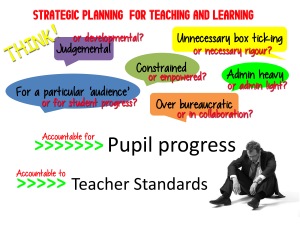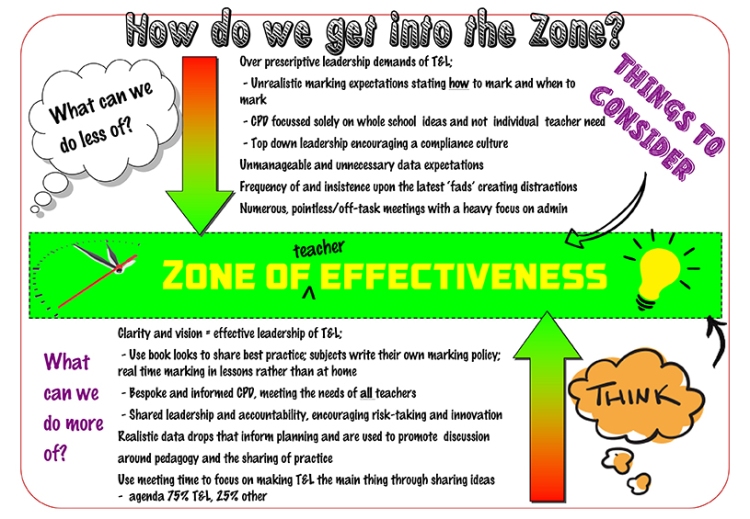Is it fear? Is it a case of ‘we’ll do what we’ve always done and it’ll be fine‘? Perhaps some school leaders aren’t fans of change, or even worse, they are completely oblivious to the negative impact that their approach is potentially having on teachers within their school. I want this blog to be read as a solutions focused and not perceived as a swipe towards any particular school process in place around accountability. To be honest, I’m getting frustrated with the current volume of negativity on social media surrounding our great profession. This annoyance is not aimed at the teachers posting some horrific stories about workload, wellbeing and the bureaucratic processes they have to conform to, but more anger at how some school leaders are imposing ridiculous monitoring regimes that are, in some cases, driving brilliant teachers out of the profession.
As the great Henry Ford once said; “If you always do what you’ve always done, you’ll always get what you’ve always got.” and in the case of school leadership, this mantra is an easy, convenient way to operate, and for some it provides a very simple metric for judging teachers/their teaching, making the associated act of putting a number or grade on it justified. Even worse, this can set in motion a landslide of distrust, low morale, ‘box ticking’, game playing and superficial ‘show pony’ approaches to teaching, all leading to a potentially toxic culture. So it’s time to get realistic, strip things back to basics and press the reset button, for the good of everyone.
“some school leaders are imposing ridiculous monitoring regimes that are, in some cases, driving brilliant teachers out of the profession.”
What if I told you that in our school we don’t undertake any lesson observations (only peer-to-peer developmental upon teacher request), we have stripped back the frequency of data collection, our CPD offer is personalised and we do not force staff to attend just to tick a directed time ‘box’, we have no more than one meeting in any one week and only if it is necessary, and the list goes on. And taking all this into consideration, what if I told you our school has a progress score of +0.5. I believe an amazing school is where it’s about doing the simple things consistently well, all of the time. Ultimately as a profession, we are accountable for  students’ progress and accountable to the teacher standards. This means that everything else; all of the fads, monitoring regimes, paperwork, planning forms, class plans and an insistence on a delivering a preferred style of teaching is all down to how schools over complicate their approach to accountability. Over the last 10 years I have been on an improvement journey in two different schools, both of which have improved rapidly. Throughout some very dark times, not once did I waver from always considering first and foremost, how every decision will benefit our students and staff and if i doesn’t, don’t do it! I think there can be a tendency to capture information and put in place processes with the sole or primary purpose to please a particular audience (Ofsted) and this is wrong on every level. I believe that achieving high levels of progress for all students is unquestionably linked to giving teachers the freedom to teach how they want to. This common sense approach most certainly isn’t rocket science, in fact, it probably reads ridiculously simple and that’s because it is. It all starts with mindset; no teacher wakes up in the morning and thinks “I know, I’ll go to work today to do a bad job!” or at least, I have never met one who does. Also, depending on where a school is in terms of its reputation, performance and overarching judgement, there can also be a high risk of blanketing every teacher with the same monitoring regime (observations, frequency of marking etc), lesson planning expectations and unmanageable administrative workloads.
students’ progress and accountable to the teacher standards. This means that everything else; all of the fads, monitoring regimes, paperwork, planning forms, class plans and an insistence on a delivering a preferred style of teaching is all down to how schools over complicate their approach to accountability. Over the last 10 years I have been on an improvement journey in two different schools, both of which have improved rapidly. Throughout some very dark times, not once did I waver from always considering first and foremost, how every decision will benefit our students and staff and if i doesn’t, don’t do it! I think there can be a tendency to capture information and put in place processes with the sole or primary purpose to please a particular audience (Ofsted) and this is wrong on every level. I believe that achieving high levels of progress for all students is unquestionably linked to giving teachers the freedom to teach how they want to. This common sense approach most certainly isn’t rocket science, in fact, it probably reads ridiculously simple and that’s because it is. It all starts with mindset; no teacher wakes up in the morning and thinks “I know, I’ll go to work today to do a bad job!” or at least, I have never met one who does. Also, depending on where a school is in terms of its reputation, performance and overarching judgement, there can also be a high risk of blanketing every teacher with the same monitoring regime (observations, frequency of marking etc), lesson planning expectations and unmanageable administrative workloads.
“If you always do what you’ve always done, you’ll always get what you’ve always got.”
My plea, my wish, my request to schools is to approach the leadership of teaching and learning in the same way as we do our own teaching. Whereby we give tailored support to ensure everyone develops, where subtle differentiation is the key. I’m sure you would agree, that a one size fits all approach to the teaching of a mixed ability class isn’t going to allow all students the opportunity to progress, but instead we look to set high levels of challenge and scaffold learning around need, based on an acute understanding of students prior attainment and ability. Surely then, this is the same for teaching? The differentiation comes through teachers’ own deep analysis of their practice and the identification of ‘need’ in order to further develop. Meaning the scaffolding comes about through personalised professional development. There still needs to be a bottom line, and there needs to be quality assurance processes in place to understand what is typical and to bring about consistency. However, this doesn’t need to take the form of a top down approach where SLT run around with clip boards, or even worse, placing all your ‘eggs’ in a wholesale pedagogical ‘basket’. As the chances are every teacher and every department/subject will have a different aspect of teaching and learning to develop. I would also expect that this will frequently change, as the school year ebbs and flows. This is about empowerment, earned autonomy, high levels of trust and high levels of challenge in a low threat environment. Middle leaders (although I don’t personally like that term) should lead and be trusted to do so, because if they simply carry out instructions from senior leaders then they are just managers.
“This is about earned autonomy and high levels of trust”
The difficulty, or perhaps convenience for some, is how to bring about consistency across a school and at the same time allow teachers and department teams to identify and work on their own specific areas for improvement. I would like to offer one approach, one that works for us in our school and has empowered leadership at all levels. An overarching framework is provided with a fortnightly focus to ensure a consistent approach is in place, however, the focus within this is driven by the department team, informed by their own approach to quality assurance and the sharing of practice with colleagues.
“This is about empowerment, earned autonomy, high levels of trust and high levels of challenge in a low threat environment.”
And here’s something to consider in terms of mindset when reviewing or planning a whole school quality assurance strategy:
I’d be interested to hear your thoughts and also how your school supports the growth and love of teaching and learning.
Follow @gary_s_king




Discussion
No comments yet.